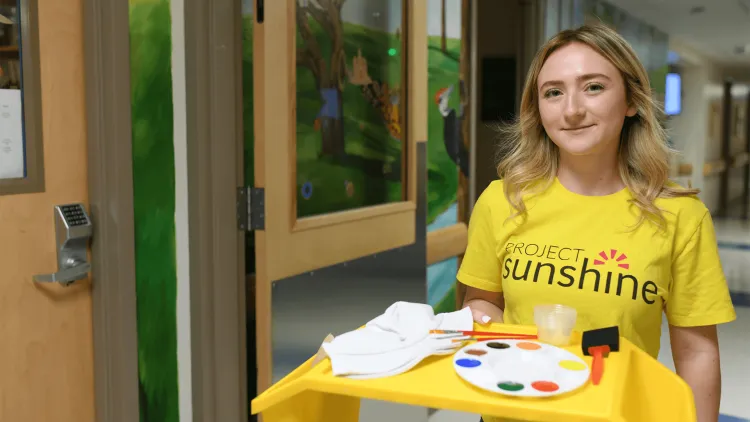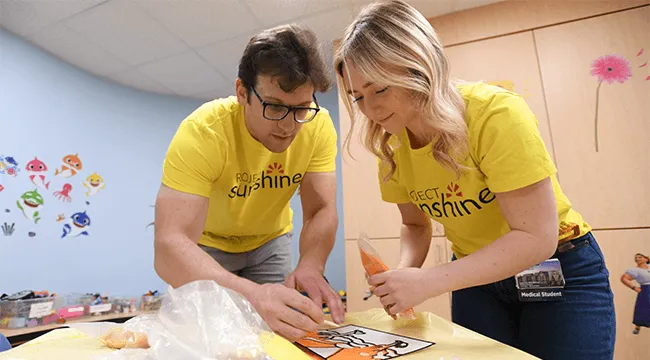Five teams of UVM Larner College of Medicine Class of 2028 medical students, along with students from the Geisel School of Medicine at Dartmouth College as well as the Vermont Law and Graduate School, were selected to participate in the 2025–26 Schweitzer Fellows Program. As fellows, the students will spend hundreds of hours over the next year developing and completing sustainable, evidence-based, collaborative projects that address health disparities in the local community.
Founded in 1996, the New Hampshire / Vermont Schweitzer Fellowship is one of 10 currently active Albert Schweitzer Fellowship (ASF) program sites across the U.S. dedicated to developing a pipeline of emerging professionals who enter the workforce with the skills and commitment necessary to address unmet health needs. The fellows are chosen competitively from graduate health, professional, and law student applicants enrolled at institutions in New Hampshire and Vermont. At the Larner College of Medicine, Molly Rideout, M.D., professor of pediatrics, and Tim Lahey, M.D., M.M.Sc., professor of medicine, serve as faculty co-directors, providing fellows with mentorship and support.
“Schweitzer Fellows are not given a project or told to address a specific health need,” said Nancy Gabriel, director of the New Hampshire / Vermont Schweitzer Fellowship. “They follow their passion and collaborate with community partners to co-create initiatives that address unmet needs. The Schweitzer Fellowship aims to be transformative for both the fellows and community participants.”
Each of the teams works with a community-based organization to address an unmet health need by creating and carrying out yearlong projects with direct service at their core. The Larner Class of 2028 members and projects are as follows:
Ayda Öktem and Connor Nowak
Öktem and Nowak are hosting a series of educational workshops to foster healthy behaviors in members of the prison population who will soon be reentering society. The workshops focus on critical health issues, including nutrition and physical activity, substance use and overdose prevention, reproductive health, and navigating Vermont’s health care systems. By equipping participants with practical knowledge and resources, the students hope to improve health outcomes upon reentry. Community Partner: Chittenden Regional Correctional Facility
Hiba Hussain and Grace Fleming
Hussain and Fleming are exploring the impact and efficacy of mentorship programming on the mental health of refugee high school youth in the Winooski School District. They intend to implement a strengths-based toolkit for mentors that fosters cultural pride and empowers mentor–mentee pairings to discuss such topics as health literacy, nutrition, and stress management, nurture a sense of community belonging, and promote self-efficacy needed to manage well-being as they transition into adulthood. Community Partner: Inner Space

Sabrina Herzberg and Mike Bergner
Herzberg and Bergner bring engaging arts and crafts activities to children hospitalized at the UVM Children’s Hospital. Every Saturday morning, they do art projects with patients and work with the hospital’s child life specialists to include parents and siblings with toys or activities. The project aims to support patients’ emotional well-being and sense of normalcy during hospitalization. By fostering play, curiosity, and connection, they hope to make the hospital experience less stressful and more enriching for pediatric patients and their families. Herzberg and Brenner intend to expand this project to include additional medical students, possibly creating a new student interest group to sustain the program. Community Partners: UVM Children’s Hospital and Project Sunshine
“Schweitzer Fellows … follow their passion and collaborate with community partners to co-create initiatives that address unmet needs.” — Nancy Gabriel, director of the New Hampshire/Vermont Schweitzer Fellowship
Jonathan Slowey and Nour Hassan
Slowey and Hassan are collaborating with Pathways Vermont to establish a wound care program at a local community center. Specifically designed for individuals affected by substance use and homelessness, their project aims to disrupt the cycle of untreated wound infections by bringing community-requested resources and support to an accessible location. By intervening early at the community level, they hope to decrease the number of preventable wound infections requiring hospital admission, build trust with historically underserved Vermonters, and create a sustainable resource for ongoing community use. Community Partner: Pathways Vermont
Maya Davis and Isabel Kay
Davis and Kay’s project aims to develop and deliver culturally sensitive reproductive and sexual health education programming for unhoused and housing-insecure individuals in the Burlington area. They are collaborating with the Community Health Centers of Burlington to increase access to vital health information, create a safe space for dialogue, and empower individuals to make informed decisions about their health. Community Partner: Community Health Centers of Burlington
Upon completion of their fellowship year, fellows will become Schweitzer Fellows for Life and join a network of more than 4,000 Schweitzer alumni who are skilled in, and committed to, deeply and collaboratively addressing the health needs of under-resourced communities throughout their careers. To date, more than 350 Schweitzer Fellows have provided more than 50,000 hours of service to New Hampshire’s and Vermont’s most under-resourced communities. The program is supported by a Community Advisory Board funded entirely by partnerships, grants, and charitable contributions.
“The process of moving their fellowship projects from an initial concept to completion teaches fellows valuable skills, learning from the community and peers from a wide range of disciplines. As Schweitzer Fellows develop professionally, this skill is critical to their ability to effect larger-scale change” said Samuel Bradley Jr., D.S.W., board chair of the Albert Schweitzer Fellowship board of directors.
